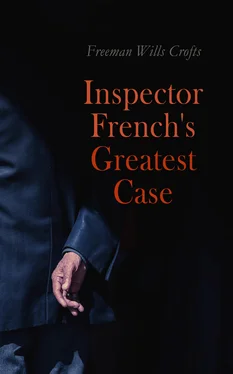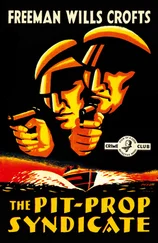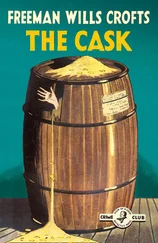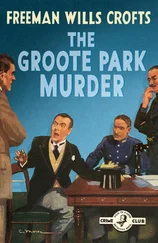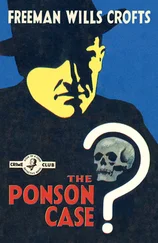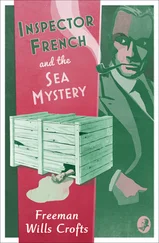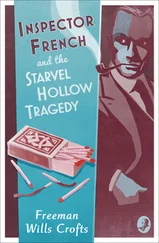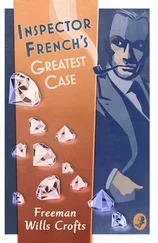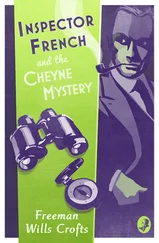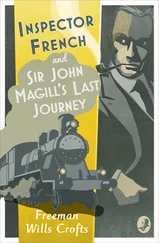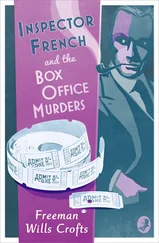It appeared that the traveller was unmarried, and Mr. Schoofs did not know if he had any living relatives other than Harrington. He boarded with Mevrouw Bondix, in the Kinkerstraat, and thither the two men betook themselves, French begging the other’s company in case he should be needed as interpreter. Mevrouw Bondix was a garrulous little old lady who had but little English, and upon whom Schoofs’ questions acted as a push button does on an electric bell. She overwhelmed them with a flood of conversation of which French could understand not one word, and from which even the manager was hard put to it to extract the meaning. But the gist of the matter was that Vanderkemp had left her house at half-past eight on the night before the murder, with the expressed intention of taking the 9.00 train for London. Since then she had neither seen him nor heard from him.
“But,” French exclaimed, “I thought you told me he had crossed by the daylight service on the day of the murder?”
“He said he would,” Schoofs answered with a somewhat puzzled air. “He said so most distinctly. I remember it particularly because he pointed out that Mr. Duke would probably ask him, after the interview, to start by the afternoon Continental train on his new journey, and he preferred to travel during the previous day so as to insure a good night’s sleep in London. He said that in answer to a suggestion of mine that he would be in time enough if he went over on the night before his interview.”
“What time do these trains get in to London?”
“I don’t know, but we can find out at the office.”
“I’d like to go to the Central Station next, if you don’t mind coming along,” French declared, “so we could look them up there. But before I go I want you to tell me if Mr. Vanderkemp figures in any of these?” He pointed to a number of photographic groups which adorned the chimneypiece and walls.
It happened that the missing traveller appeared in one of the groups, and both Mr. Schoofs and Mevrouw Bondix bore testimony to the excellence of the portrait.
“Then I’ll take it,” French announced, as he slipped the card into his pocket.
The two men next went to the Central Station and looked up the trains. They found that the day service did not reach Victoria until 10.05 p.m. The significance of this was not lost upon French. Orchard stated he had reached the office in Hatton Garden at 10.15, and that it could not have been later was established by the evidence of Constable Alcorn. The body at that time was cold, so that the crime must have taken place some considerable time earlier. A man, therefore, who had crossed by the daylight service from Amsterdam could not possibly have had time to commit the murder. Had Vanderkemp lied deliberately to Schoofs when he told him he was using that daylight service? If so, was it in order to establish an alibi? Had he a secret appointment with Gething for an earlier hour on the fatal evening, and had he crossed the night before with the object of keeping it? French felt these were questions which required satisfactory answers, and he made a mental note not to rest until he had found them.
With his new friend’s aid he began to interrogate the staff of the Central Station, in the hope of ascertaining whether or not the missing man had actually left by the train in question. But of this he could learn nothing. None of the employees appeared to know Vanderkemp’s appearance, nor after that lapse of time could any one recall having seen a passenger of his description.
That day and the next French spent in the charming old city, trying to learn what he could of the missing man’s life and habits. He came across a number of persons who were acquainted with the traveller, but no one with whom he had been really intimate. None of these people could give him much information, nor did any of them seem to care whether or no Vanderkemp should ever be heard of again. From all he heard, French concluded that Vanderkemp’s character was such as might be expected in the guilty man, but there was but little evidence of motive, and none at all of guilt.
He returned to London by the night service, and having ascertained that the steamer he crossed by was the same that had run on the date of Vanderkemp’s assumed journey, he made exhaustive inquiries as to the latter from the staff on board, unfortunately with negative results.
Next day his efforts were equally fruitless. He spent most of it in discussing the situation with Mr. Duke, and trying to make a list of the persons who could have had access to the typewriter, but nowhere could he get a gleam of light. The authorship of the letter remained as inscrutable a mystery as the murder of Gething.
Having circulated a description of Vanderkemp containing a copy of the photograph, French went home that night a worried and disconsolate man. But though he did not know it, further news was even at the moment on the way to him.
Конец ознакомительного фрагмента.
Текст предоставлен ООО «ЛитРес».
Прочитайте эту книгу целиком, купив полную легальную версию на ЛитРес.
Безопасно оплатить книгу можно банковской картой Visa, MasterCard, Maestro, со счета мобильного телефона, с платежного терминала, в салоне МТС или Связной, через PayPal, WebMoney, Яндекс.Деньги, QIWI Кошелек, бонусными картами или другим удобным Вам способом.
